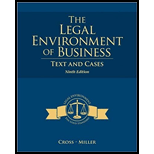
The Legal Environment of Business: Text and Cases
9th Edition
ISBN: 9781305764460
Author: Frank B Cross/ Roger LeRoy Miller
Publisher: CENGAGE C
expand_more
expand_more
format_list_bulleted
Question
thumb_up100%
Chapter 1, Problem 5BCP
Summary Introduction
Case summary:
The manger of Incorporation A was transferred between multiple stores of city C. He did not suffer any kind of loss in his payments or responsibilities due to the frequent transfers. However, an EEOC complaint was filed by him against the incorporation claiming that it intended to make the store ‘predominantly Hispanic’.
To find: The primary sources of the court’s decision in the provided case.
Expert Solution & Answer
Trending nowThis is a popular solution!

Students have asked these similar questions
If UPPA Company had net income of $561,600 in 2022 and it experienced a 17% increase in net income over 2021, what was its 2021 net income?
Financial accounting
Solve this question accounting
Chapter 1 Solutions
The Legal Environment of Business: Text and Cases
Knowledge Booster
Similar questions
arrow_back_ios
SEE MORE QUESTIONS
arrow_forward_ios
Recommended textbooks for you
 BUSN 11 Introduction to Business Student EditionBusinessISBN:9781337407137Author:KellyPublisher:Cengage Learning
BUSN 11 Introduction to Business Student EditionBusinessISBN:9781337407137Author:KellyPublisher:Cengage Learning Essentials of Business Communication (MindTap Cou...BusinessISBN:9781337386494Author:Mary Ellen Guffey, Dana LoewyPublisher:Cengage Learning
Essentials of Business Communication (MindTap Cou...BusinessISBN:9781337386494Author:Mary Ellen Guffey, Dana LoewyPublisher:Cengage Learning Accounting Information Systems (14th Edition)BusinessISBN:9780134474021Author:Marshall B. Romney, Paul J. SteinbartPublisher:PEARSON
Accounting Information Systems (14th Edition)BusinessISBN:9780134474021Author:Marshall B. Romney, Paul J. SteinbartPublisher:PEARSON
 International Business: Competing in the Global M...BusinessISBN:9781259929441Author:Charles W. L. Hill Dr, G. Tomas M. HultPublisher:McGraw-Hill Education
International Business: Competing in the Global M...BusinessISBN:9781259929441Author:Charles W. L. Hill Dr, G. Tomas M. HultPublisher:McGraw-Hill Education

BUSN 11 Introduction to Business Student Edition
Business
ISBN:9781337407137
Author:Kelly
Publisher:Cengage Learning

Essentials of Business Communication (MindTap Cou...
Business
ISBN:9781337386494
Author:Mary Ellen Guffey, Dana Loewy
Publisher:Cengage Learning

Accounting Information Systems (14th Edition)
Business
ISBN:9780134474021
Author:Marshall B. Romney, Paul J. Steinbart
Publisher:PEARSON


International Business: Competing in the Global M...
Business
ISBN:9781259929441
Author:Charles W. L. Hill Dr, G. Tomas M. Hult
Publisher:McGraw-Hill Education
